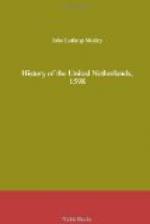For us, whose business it is to deal with, and, so far as human fallibility will permit, to improve our inevitable form of government-which may degenerate into the most intolerable of polities unless we are ever mindful that it is yet in its rudimental condition; that, although an immense step has been taken in the right direction by the abolition of caste, the divorce of Church and State, and the limitation of intrusion by either on the domain of the individual, it is yet only a step from which, without eternal vigilance, a falling back is very easy; and that here, more than in other lands, ignorance of the scientific and moral truths on—which national happiness and prosperity depend, deserves bitter denunciation—for us it is wholesome to confirm our faith in democracy, and to justify our hope that the People will prove itself equal to the awful responsibility of self-government by an occasional study of the miseries which the opposite system is capable of producing. It is for this reason that the reign of the sovereign whose closing moments have just been recorded is especially worthy of a minute examination, and I still invite a parting glance at the spectacle thus presented, before the curtain falls.
The Spanish monarchy in the reign of Philip II. was not only the most considerable empire then existing, but probably the most powerful and extensive empire that had ever been known. Certainly never before had so great an agglomeration of distinct and separate sovereignties been the result of accident. For it was owing to a series of accidents—in the common acceptation of that term—that Philip governed so mighty a realm. According to the principle that vast tracts: of the earth’s surface, with the human beings feeding upon: them, were transferable in fee-simple from one man or woman to another by marriage, inheritance, or gift, a heterogeneous collection of kingdoms, principalities, provinces, and: wildernesses had been consolidated, without geographical continuity, into an artificial union—the populations differing from each other as much as human beings can differ, in race, language, institutions, and historical traditions, and resembling each other in little, save in being the property alike of the same fortunate individual.
Thus the dozen kingdoms of Spain, the seventeen provinces of the Netherlands, the kingdoms of the Two Sicilies, the duchy of Milan, and certain fortresses and districts of Tuscany, in Europe; the kingdom of Barbary, the coast of Guinea, and an indefinite and unmeasured expanse. of other territory, in Africa; the controlling outposts and cities all along the coast of the two Indian peninsulas, with as much of the country as it seemed good to occupy, the straits and the, great archipelagoes, so far as they had—been visited’by Europeans, in Asia; Peru, Brazil, Mexico, the Antilles—the whole recently discovered fourth quarter of the world in short, from the “Land of Fire” in the South to the frozen regions of the North—as




